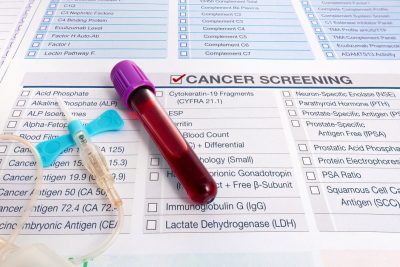Cancer Screenings: What You Need to Know
The most important aspect of maintaining good health is staying informed about preventive care measures. Cancer screenings stand at the forefront of the battle against this devastating disease, offering individuals the opportunity to detect potential threats early on and take proactive steps toward better health outcomes. However, misconceptions and uncertainties often shroud these life-saving procedures. Empower yourself, as a patient, with the insights you need to navigate the realm of cancer screenings and arm yourself with the tools to safeguard your health.
In 2023, there are estimated to be 1.9 million new cancer diagnoses and 609,820 deaths from cancer. It is the second most common cause of death in the United States, according to the American Cancer Society. Preventive measures such as cancer screenings help detect issues early on when intervention has the highest efficacy rate. Despite the benefits of cancer screenings, many people forgo them for various reasons.
According to a release by the Prevent Cancer Foundation®, 39% of survey participants did not know they needed to be screened, 37% of participants had “no symptoms” that would lead them to have a screening and 31% of participants cited the costs associated with screenings as the reason why they did not have them. The good news is that, while insurance coverage for cancer screenings depends on the health plan you are enrolled in, most plans are required to cover some cancer screening costs under the Affordable Care Act (ACA). You can call your health plan and ask to know what is covered as well as any out-of-pocket expenses that may be incurred from the tests beforehand.
Related: Addressing the Financial Concerns of Cancer Treatment
To ensure your health remains a top priority, cancer screenings are recommended based on age and gender.
- Ages 21 to 29: For women, routine breast examinations can help detect any abnormalities that may lead to breast cancer. Additionally, cervical cancer testing such as a Pap test for women becomes critical to protect against cervical cancer, which is often preventable.
- Ages 30 to 39: Women continue to need frequent breast examinations and cervical cancer testing.
- Ages 40 to 49: Both men and women should begin talking to their physician about colon cancer screenings. Men around the age of 45 are recommended to have prostate cancer screenings. Women continue to need frequent breast examinations and cervical cancer screenings and have the choice to start annual breast cancer screenings with mammograms.
- Ages 50 to 64: Both men and women are recommended to have colon cancer screenings in addition to breast, cervical, colon and prostate screenings. However, both groups should seek out lung cancer testing at this time, especially if they have any history of smoking.
- Ages 65 and up: Breast, cervical, colon, prostate and lung cancer screenings are important, and some cancer screenings are covered by Medicare.
Related: Men’s Health Month: Steps to Reduce Cancer Risks and Lead Healthier Lives

Keep in mind, however, that your physician may recommend certain cancer screenings earlier or more often if you are at higher risk. For example, while colon cancer is most seen in older individuals (aged 45 and up), if you have a high risk for this cancer or a family history of it, you may be asked to have colon cancer tests at a younger age or more frequently. To make sure you are receiving the right cancer screenings at the right time, talk with your physician and discuss the best plan for your unique health situation. Many cancers, if caught early, can be diagnosed and treated — drastically improving the likelihood of survival and success.
Cancer screenings also include a variety of different types of cancer tests and are different from diagnostic testing. Interestingly enough, cancer screenings are not used to detect cancer; this is a common misconception that most people have about screenings. The main goal of screenings is to detect any present abnormalities that will lead to further cancer testing. A physical exam; lab tests such as blood, urine and tissue tests; imaging tests like x-rays; and genetic tests can all identify whether something abnormal may be present. Tests that identify cancer are called diagnostic tests, which include additional laboratory testing, imaging and biopsies that your physician will order.
Learning that you may have cancer is a frightening experience, and at first, you may question the validity of the results. How often are there false positives and false negatives? While cancer screenings and diagnostic tests are not always 100% accurate, there is a lower rate of false positives and false negatives thanks to the advancements in cancer testing as well as the precision used when analyzing samples. Physicians are meticulous in their duties and in reviewing test results. For this reason, physicians will often conduct additional testing to ensure the initial results were correct before beginning any treatments.
If the screening and diagnostic test report that cancer is present, your physician will refer you to a specialist, also known as an oncologist. An oncologist is a doctor who has been trained in diagnosing and treating cancer. You may even transition to an oncologist who has received training in and focuses on your specific type of cancer. Your oncologist will review your medical history, including your cancer screenings and other tests, to determine a treatment plan that is designed uniquely for you.
Stopping cancer in its tracks and before it has had a chance to metastasize begins with a single step: having the recommended cancer screening at the right time in your life. Screenings offer the gift of early detection, allowing you to confront potential cancerous threats head-on and increase the chances of successful treatment. Remember, knowledge is power, and being proactive about your health is an investment that yields invaluable returns.
To schedule an appointment with one of our oncologists, call our office.
